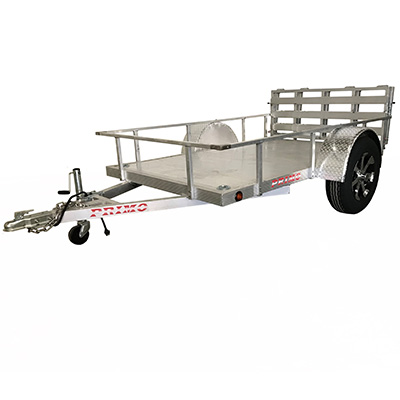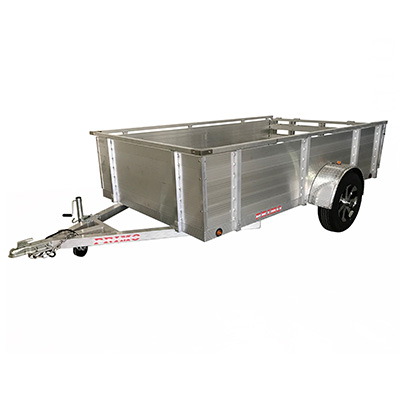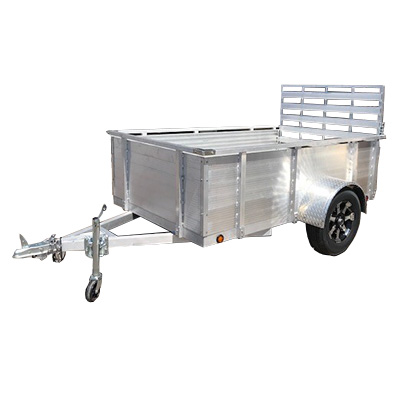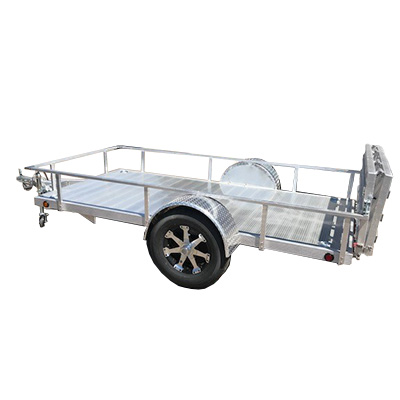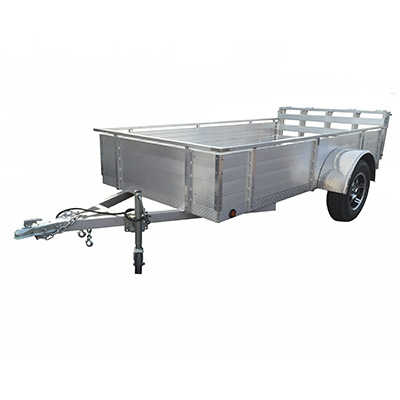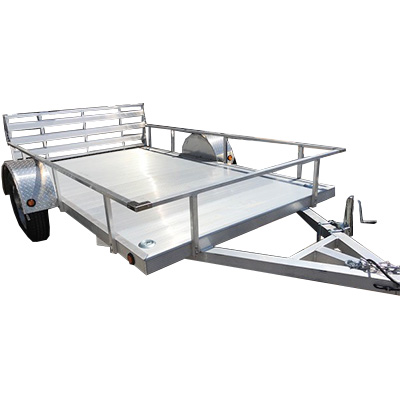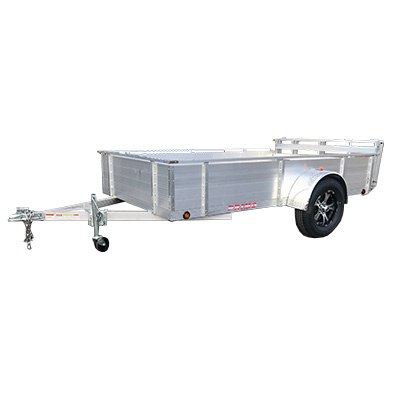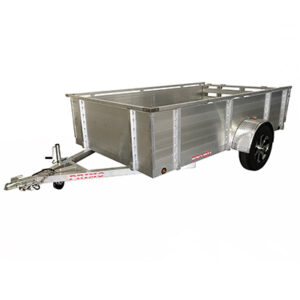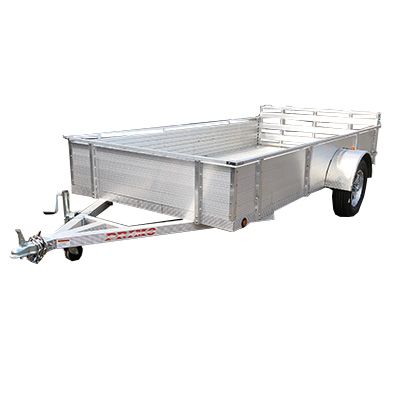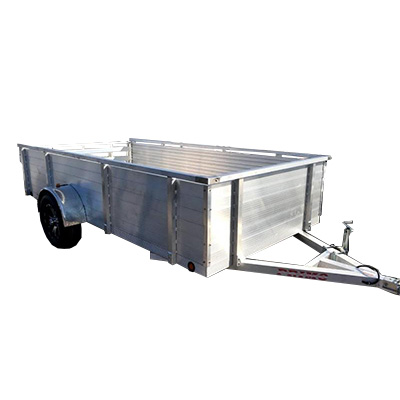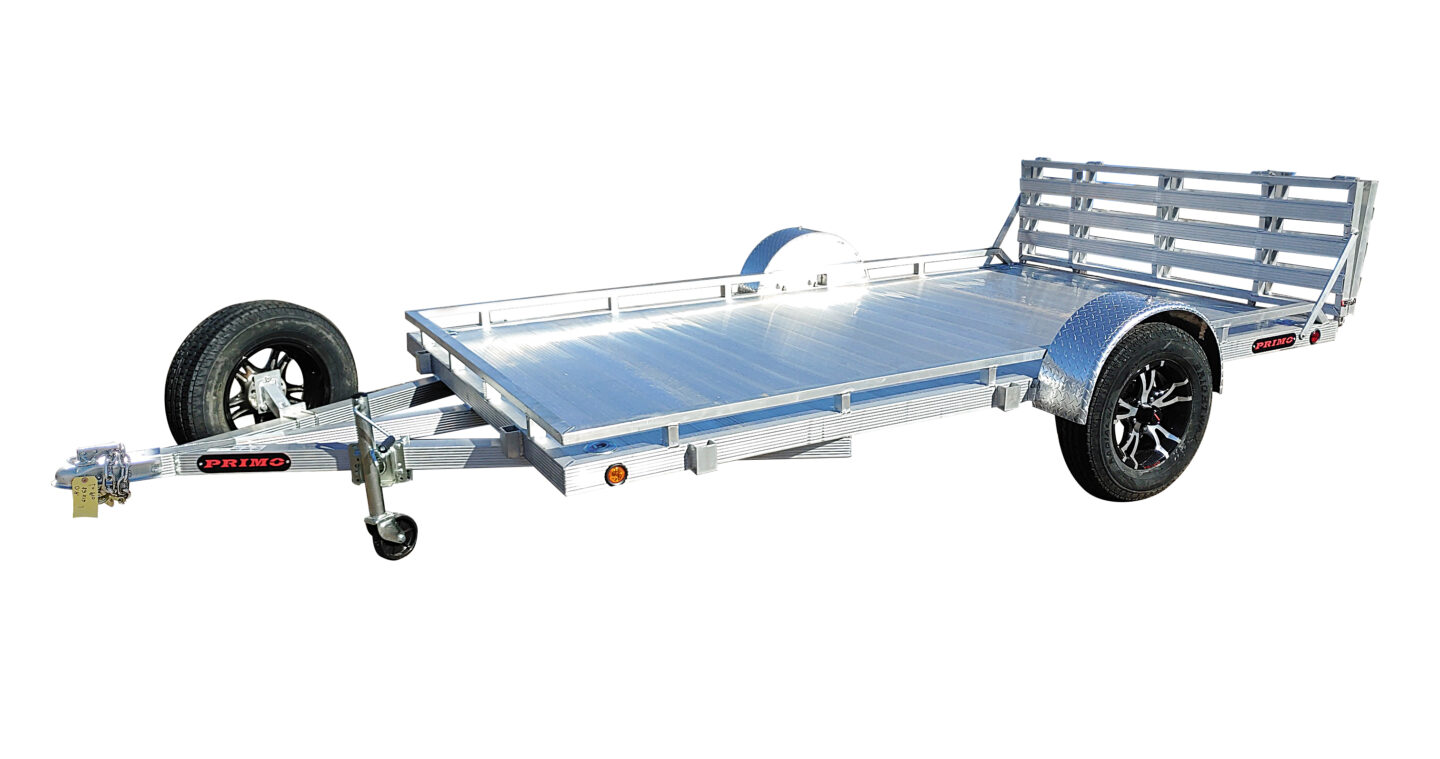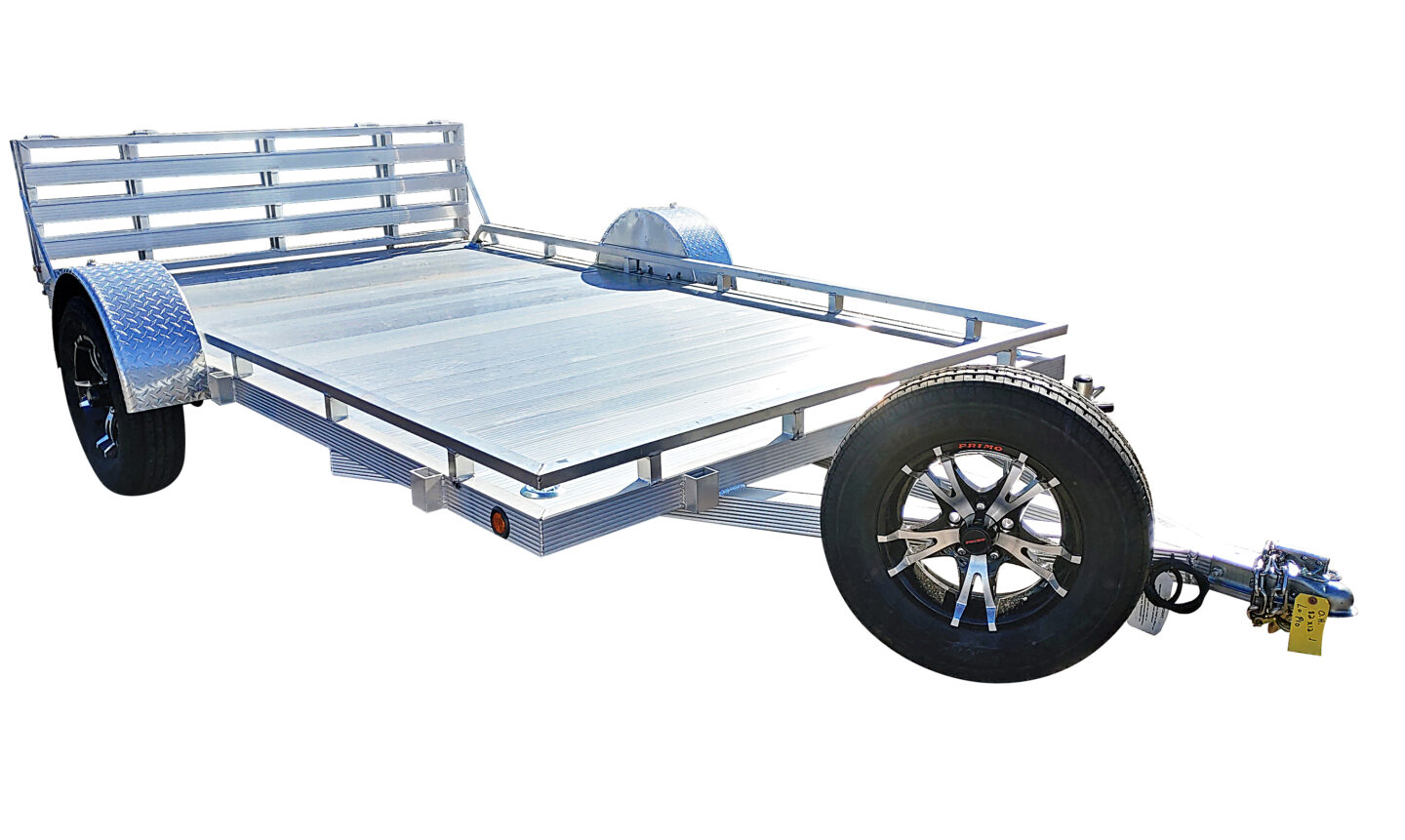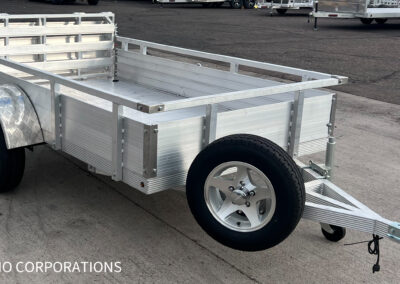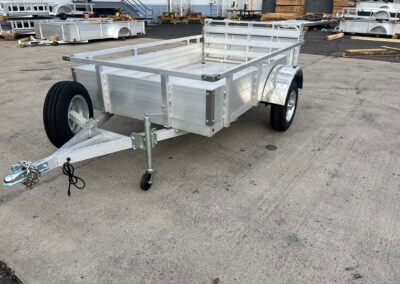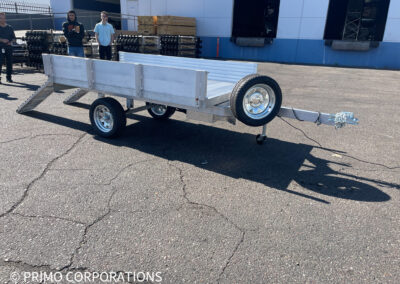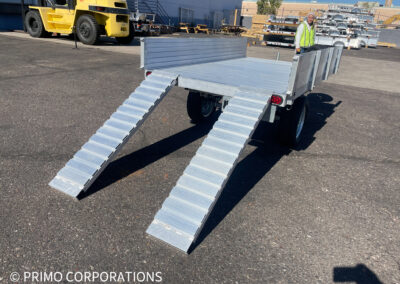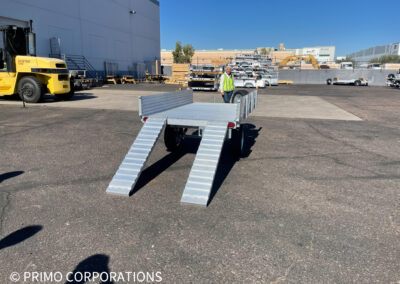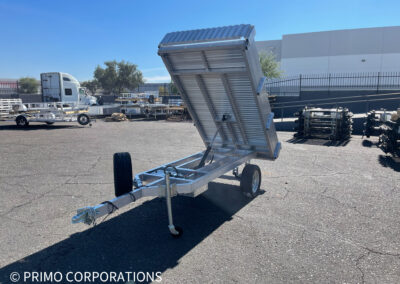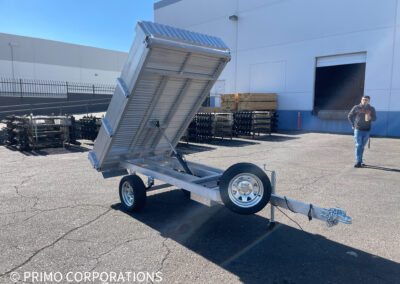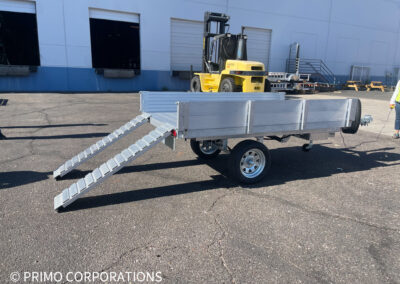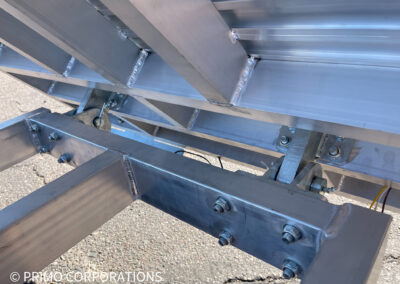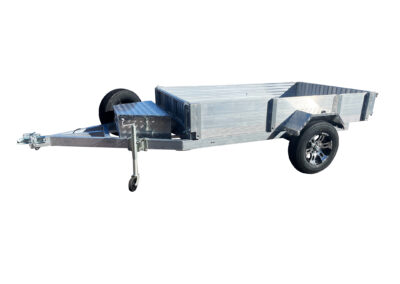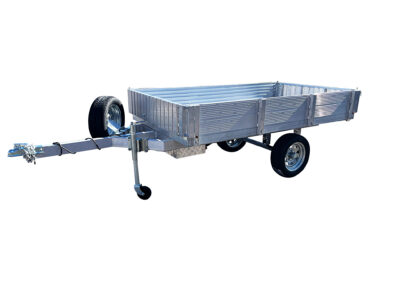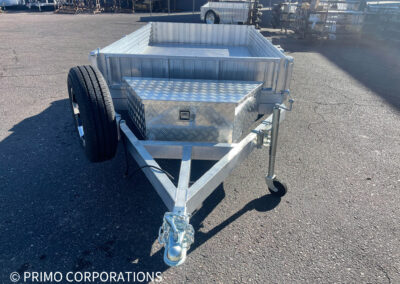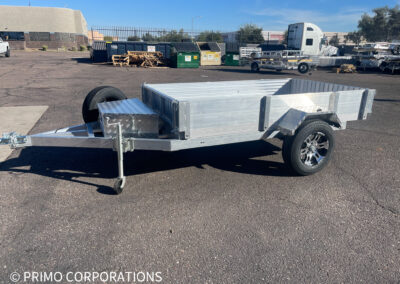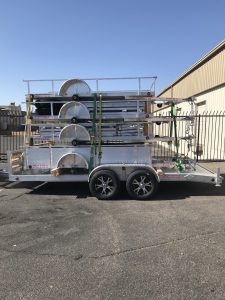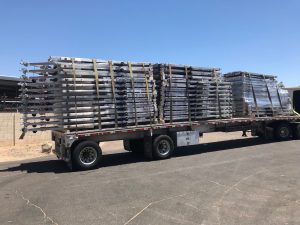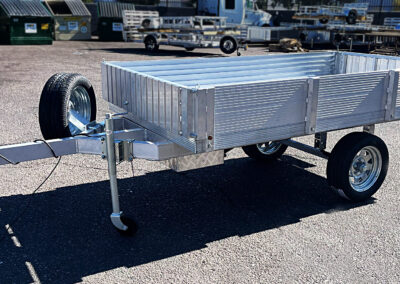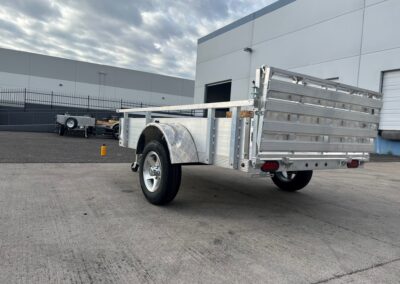Utility Trailers
Aluminum utility trailers are far better than steel trailers when it comes to both weight and durability. Flexibility is an important factor when choosing a trailer because working with heavy equipment increases the potential for damaging your trailer. With an aluminum trailer, there is a higher likelihood the trailer can be repaired back to its original state. Our best aluminum utility trailers are a great long-term investment and require less maintenance. They can withstand most weather conditions and are lightweight making them easy to tow. We encourage you to check out for all your aluminum utility trailers needs at PRIMO TRAILER to find out why we’re rated the best aluminum trailer manufacturer.
With purchasing your first utility trailer you see a number of choices offered in both aluminum and steel. Whether you’re a first time utility trailer buyer or a veteran trailer owner looking for your next utility trailer, you want to be sure which is better; aluminum or steel. The answer is simple: aluminum.
Aluminum utility trailers are far better than steel trailers when it comes to both weight and durability. Flexibility is an important factor when choosing a trailer because working with heavy equipment increases the potential for damaging your trailer. With an aluminum trailer, there is a higher likelihood the trailer can be repaired back to its original state.
Aside from this, aluminum utility trailers do not require repetitive maintenance as opposed to steel trailers. When you’re using your trailer consistently for many years, you’ll want something easy to maintain. Aluminum has better corrosion resistance contributing to longevity!
Definitely consider the weight when purchasing a trailer to lessen the stress on your vehicle. Aluminum trailers are 10-15% lighter than steel trailers. Your vehicle’s engine doesn’t have to work as hard which also equates to better fuel usage and helps reduce tire wear and engine wear when used correctly.
For example, Primo aluminum utility trailers come fit with their own tires and rims manufactured in-house on our trailers, it decreases the likelihood of you having to replace your tires often when towing properly. You’ll want to keep things like this in mind when you’re looking for your next aluminum utility trailer.
In conclusion, our best aluminum utility trailers are a great long-term investment and require less maintenance. They can withstand most weather conditions and are lightweight making them easy to tow. We encourage you to check out our website for all your aluminum utility trailers needs at www.primotrailer.com to find out why we’re rated the best aluminum trailer manufacturer.
You can also stay up to date with the latest news from Primo Trailers by following us on Linkedin, Facebook, Twitter, Youtube, and Instagra
Aluminum utility trailers are great tools to have in your possession. They’re very useful for hauling landscaping equipment, carrying small vehicles, hauling construction supplies, and moving home furnishings. Below will give you a better idea of usage.
- Hauling landscaping tools
The most common use for an aluminum utility trailer is carrying landscaping equipment. They make it easy to transport all of the tools and equipment needed to keep your business running smoothly. In addition, they can be fitted with other trailer parts and accessories to help organize your tools.
- Carrying powersports equipment and other small vehicles
Another common use for aluminum utility trailers is to carry and haul power sports equipment and vehicles. You could load anything from motorcycles to ATV/UTVs and automobiles, or even more specialty recreational vehicles like a jetski or a snowmobile. Rather than shipping your vehicles, having your own aluminum utility trailer is a more cost effective option.
- Hauling construction supplies
Aside from business uses like hauling landscaping tools, aluminum utility trailers are great for hauling construction supplies. They’re very useful for taking equipment from stores to job sites. Open utility trailers are best for these types of transportation because they allow you to move bigger supplies.
- Home furnishings
Hiring a moving truck is costly. With your own aluminum utility trailer, you won’t have to worry about that. Although some people may not realize that utility trailers are more than capable. There are a variety of utility trailers that are fitted with higher sides that would be perfect for moving furniture. In addition, there are many trailer parts and accessories on the market today that can help to secure your furniture for those hauls. Primo Trailer Parts is a one-stop shop for all your trailer’s needs.
Consider your needs
There are two types of aluminum utility trailers you can choose from: open or enclosed. How you want to use your trailer will inform your decision when planning to buy. Take the time to browse your options, so that you’re buying an aluminum utility trailer that meets your needs perfectly.
If you would like to learn more about finding the best aluminum utility trailers with single or double axles, go to www.primotrailer.com or call Primo Trailer Sales at (480) 378-0800. We have a variety of trailers that may suit you. We look forward to helping you with your next purchase of one of the best aluminum utility trailers!
You can also stay up to date with the latest news from Primo Trailers by following us on Linkedin, Facebook, Twitter, Youtube, and Instagram.
If you need to haul large bulky items on a frequent or infrequent basis, there are a number of reasons you may want to purchase a utility trailer. A utility trailer will allow you to transport more than most vehicles can carry. If the trailer is enclosed, you can pack the trailer over a period of time, and then transport only when you are finished loading. A utility trailer will allow you to keep the towing vehicle empty to transport passengers while you are transporting the goods in the trailer. Using a trailer will also prevent damage to the interior of your towing vehicle, and it’s usually a lot easier to load. And you can avoid the hassle and expense of renting a trailer.
Another good reason to buy a trailer is that, once purchased, there is virtually no expense involved in the maintenance or upkeep. Obviously you will need to check the air pressure in the tires, grease the wheel bearings, and make sure the lighting and turn signals are operating properly. (By the way, most lighting problems originate at the plug from the tow vehicle to the trailer connection). But other than those simple tasks, the trailer is always ready to go.
Another good reason for purchasing a trailer is that licensing and insuring the trailer are easy. You can purchase a one-time “permanent license” for the trailer from the DMV. There is no annual inspection required. Generally, no additional insurance needs to be purchased unless you are using the trailer commercially. The automobile insurance covers the trailer when attached to the towing vehicle.
Choosing a trailer size and type can seem challenging, but you just need to focus on a few considerations. Think about your needs and the type of towing vehicle you have. Depending on what you are transporting, you may want an enclosed trailer or an open one. From personal experience, for general purposes, I would recommend an open trailer with dimensions of 5 feet x 10 feet for ease of transporting building materials, riding mowers, bikes, kayaks, ladders, pressure washers and other power equipment. This size is large enough to transport most everything you want but small enough that it isn’t difficult to tow or park. I also recommend the trailer be equipped with a rear gate that doubles as a ramp to expedite loading and unloading. Keeping your trailer under cover, either with a tarp or in a garage, will extend the life of the tires, paint, frame and flooring of the trailer. Tires tend to deteriorate if exposed to sun over a long period of time.
Another consideration in purchasing a trailer is choosing and installing the correct hitch for the trailer and the tow vehicle. The hitch must match the capacity of the trailer and should not be too high or low for towing the trailer. Improper balance between the towing vehicle and trailer could lead to loss of control of the tow vehicle and result in an accident. Once the trailer is attached to the ball on the hitch, make sure it is locked and that the lights are connected and working properly. The safety chains must also be attached to the tow hitch. Always check these items before pulling onto the road.
When using a trailer, you should be very careful about loading the trailer to properly center and distribute the weight. Read the manufacturer’s recommendations about loading, and check on-line recommendations on how to load the type of trailer that you have. One of the biggest dangers is that improper loading will cause the trailer to fishtail and then cause the tow vehicle to go out of control.
You should also practice driving your tow vehicle while pulling the trailer. A large empty parking lot is a great place to practice. Remember that a towing vehicle and trailer are now a unit, and the turning radius is now wider and longer because of the trailer. When towing, you must also account for the greater stopping time with a loaded or unloaded trailer behind the tow vehicle.
With a little attention to maintenance and safety, and some practice with towing, you can enjoy many years of using a trailer. All in all, a utility trailer is a valuable asset for moving and hauling any number of items, and often will pay for itself in a short period of time.
How do you take care of an aluminum trailer?
Hose down the trailer with water and use a long-handled scrub brush or mop to apply the soap, then rinse. To remove stubborn materials like yard waste or caked-on mud, a power washer and detergent usually does the trick. Let air dry or wipe dry. Aluminum forms a strong bond with the oxygen in the air.
Why use a utility trailer?
Utility trailers are made from fewer materials with fewer complicated mechanical parts. These factors make them weigh less than other comparable models, so you can haul around your rig without putting in much effort. Also, they help you save fuel and get more out of each trip, saving your time, too.
How durable are aluminum trailers?
Aluminum is also a great choice because of its lack of repetitive maintenance. Aluminum has a great resistance to rust. If you are using your trailer throughout the year, you may worry about rust, corrosion, mold etc. They require almost no maintenance and are built to last for years!
Does aluminium require maintenance?
Due to its non-corrosive nature, its finish, strength, and durability, aluminum needs very little assistance to keep in good condition and maintain its original quality. This makes it a very low maintenance material.
How do you keep an aluminum trailer from oxidizing?
Polish. As you may know, aluminum is corrosion-resistant, and its reaction with the oxygen in the air won’t affect its strength. However, oxidation may still occur, resulting in discoloration or making the finish dull. To prevent this, use foam or spray polish every once in a while.
What is the best material for a utility trailer?
Pressure-treated lumber is high quality, durable, and moisture resistant, making it the best for trailers. Pressure-treated lumber is also fire- and insect-resistant, giving it advantages over untreated wood.
What is the difference between cargo and utility trailers?
Cargo trailers are also the more expensive option. Utility trailers give you much more freedom to carry bulky or tall items and they tend to be both lighter in weight and less expensive, but your cargo is more exposed to theft and weather damage.
